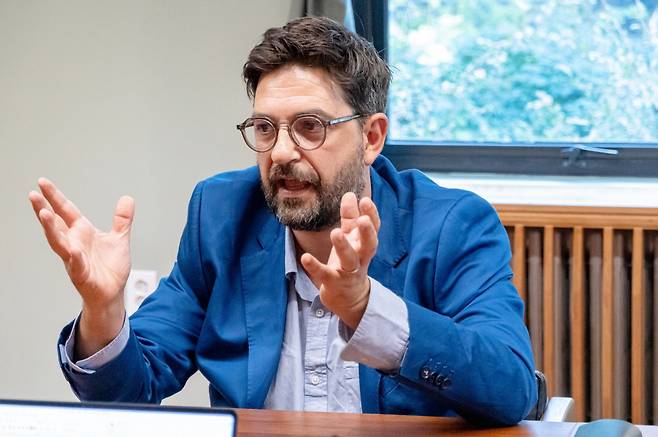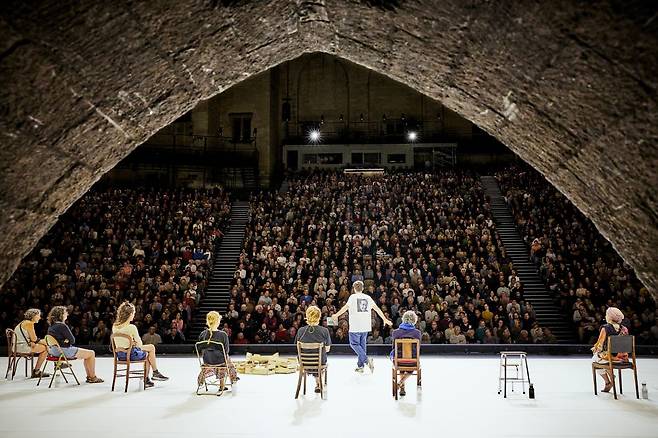[Herald Interview] Tiago Rodrigues weaves poetry, memory and collective experience in 'By Heart'
전체 맥락을 이해하기 위해서는 본문 보기를 권장합니다.
Portuguese playwright, director and actor Tiago Rodrigues credits his deep love of literature with inspiring his iconic theater piece "By Heart."
As he teaches each verse, he weaves in stories "like a labyrinth" -- of his soon-to-be-blind grandmother, of writers and characters from books, of literary greats like Boris Pasternak, critic George Steiner and a cook from the north of Portugal and a Dutch TV program called "Beauty and Consolation."
이 글자크기로 변경됩니다.
(예시) 가장 빠른 뉴스가 있고 다양한 정보, 쌍방향 소통이 숨쉬는 다음뉴스를 만나보세요. 다음뉴스는 국내외 주요이슈와 실시간 속보, 문화생활 및 다양한 분야의 뉴스를 입체적으로 전달하고 있습니다.

Portuguese playwright, director and actor Tiago Rodrigues credits his deep love of literature with inspiring his iconic theater piece “By Heart.”
Rodrigues, artistic director of the Avignon Festival in France, became the first non-French artist to lead one of the biggest performing arts festivals in the world since it was founded by Jean Vilar in 1947.
Visiting Seoul for the second time -- his first visit was as a programmer for the Seoul Performing Arts Festival -- Rodrigues brings his renowned work "By Heart" to SPAF this weekend, offering audiences an emotional, literary journey.

It is quite unlike any other theater piece.
Rodrigues takes center stage and invites 10 audience members to the stage to learn a poem (a Shakespeare sonnet) by heart with him, transforming the simple act of memorization into a deeply personal and communal experience.
The piece is an autobiographical one, according to the 47-year-old director, fulfilling a request from his grandmother when was going blind.
"My grandmother was pretty much in love with literature although she didn't have a lot of studies and she was a cook in a small village all her life. Our connection was very strong through literature. It was because of my grandmother that I fell in love with books and reading when I was a child," said Rodrigues in an interview with a group of reporters Wednesday in Seoul.
Throughout his life, his grandmother introduced him to books, and as she grew older, he became the one bringing books to her. When she was 93, the doctors told her she was going blind. So she decided to learn a book by heart and asked Rodrigues to choose the book for her.
"So my mission was how can you choose the last book for someone you love and the only book she will have in her mind and she will read for the rest of her life?"

The 10 volunteers from the audience who have no prior knowledge of which poem they will learn join Rodrigues on stage.
As he teaches each verse, he weaves in stories “like a labyrinth” -- of his soon-to-be-blind grandmother, of writers and characters from books, of literary greats like Boris Pasternak, critic George Steiner and a cook from the north of Portugal and a Dutch TV program called "Beauty and Consolation."
Rodrigues highlighted the unexpected connections and sense of “political” collectiveness that spark on stage when people memorize a poem together.
“Learning a poem is like saying to this text that you're in love with it. So it's an act of love. But when you do it together it becomes an act of resistance against death, against blindness, against the political regime, against censorship.”
The universality of “By Heart” transcends languages. Though Rodrigues speaks Portuguese, French, English and Spanish, he always teaches the sonnet in the language of the country where he is performing. For Korean audiences, he plans to teach the poem in Korean.
“The beauty of it is that the people learning the sonnet will say it much better than me, but I know it,” he said.
“There’s a connection that goes beyond the difficulty of language. And there’s something about the power of trying to translate, trying to understand the other, which is extremely important nowadays in theater but also in society.”
"By Heart" will be performed from Friday to Sunday at the Quad Theater in Daehagno. The performance will be delivered in both English and Korean, with subtitles in both languages.
By Hwang Dong-hee(hwangdh@heraldcorp.com)
Copyright © 코리아헤럴드. 무단전재 및 재배포 금지.